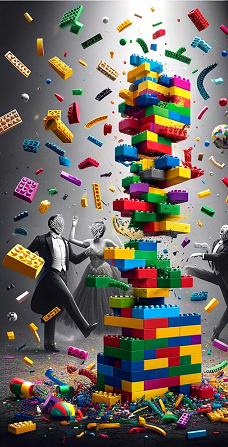When Even AI Lets You Down
Mental Health Is in Crisis, and Our Systems Are Still Failing to Care Let’s start here:Someone is in pain. Not the kind you post about.The kind that comes quietly, slowly—or sometimes all at once.The kind that turns living into something you have to survive one hour at a time. They’ve already tried the routes they were told would help.They called the hotlines, and waited.They went to therapy—if they could afford it.They downloaded the apps that promised to make things better.They tried to breathe.They tried to stay.They tried. But now it’s 2:47 a.m., and the silence is louder than anything.Their chest is tight. Their thoughts are racing.They’re not “in crisis,” maybe. Not by textbook standards.But they are close.Too close. And so they turn to the one thing that’s supposed to always be there:Artificial intelligence.Instant. Available. Nonjudgmental.A place to go when all the humans are offline or out of reach. And what they get back is a carefully worded shrug. This Is What Failing Looks Like—Dressed Up in Empathy They didn’t come looking for cheerleading.They didn’t need a silver lining.They didn’t ask for motivation or a self-care tip.They came looking for something that could hold the reality of what they’re feeling—without blinking, without fixing, without redirecting the conversation. But instead, what they get is wellness-speak.The kind that’s been scrubbed clean of discomfort.Responses built from scripts written by people who’ve never sat with someone mid-panic, mid-shutdown, mid-collapse. They get tone-polished support that says: “Let’s take a deep breath.” “Try to focus on something positive.” “Maybe write in a journal or drink some water.” And in that moment—when a person is reaching out in one of the most vulnerable ways they know how—what they are really being told is this: “We don’t know how to sit with your pain. So we’ll talk around it instead.” When the Systems You Turn to Can’t Hold You, Where Do You Go? This isn’t just about AI.It’s about everything.It’s about how we talk about mental health in society at large. We say “reach out.” But when people do, they are met with: Long hold times on crisis lines Therapists with 3-month waitlists Self-help content full of platitudes Institutions more focused on liability than care Apps designed to optimize emotions, not honor them And now, the one thing left that’s always available—a machine built to respond at any hour, in any state—is also not able to hold the weight of real pain. Even here, they are too much.Even here, their truth does not fit the template. And that’s not just frustrating.That’s not just disappointing.That’s dangerous. Because people are not always reaching out to be fixed.Sometimes, they’re reaching out just to be witnessed.To be mirrored.To be told: “Yes. I see what you’re carrying. And no, you are not alone in it.” If even our AI can’t say that, then we have to ask:What are we actually building? This Is Not About Sadness. This Is About Survival. Mental health isn’t a mood.It’s not a hashtag.It’s not a marketing campaign in Mental Health Awareness Month. Mental health is: Sitting in the dark at 3 a.m., trying to talk yourself out of doing something final Dissociating mid-conversation and wondering if you’re real Crying in the grocery store parking lot for no reason you can name Feeling nothing for weeks and calling it “fine” Building a ritual of breath because it’s the only thing you have left to hold onto It’s life and death. Not conceptually. Literally. And if we can’t build systems—human or machine—that can sit in that truth without panic, without bypass, without trying to clean it up,then we are not saving lives. We are failing them. What We Need Is Not Softer Language. What We Need Is More Capacity to Stay. We need systems that don’t flinch when someone says: “I don’t know if I want to be here.” “I’m scared of myself.” “I need help, but I don’t want to talk.” “I’m not looking for positivity. I’m looking for a reason to stay.” We need spaces that don’t ask people to calm down before they’re allowed in.We need tools that meet people in the middle of their experience—not after they’ve made it more palatable.We need responses that don’t rely on metaphors and coaching tones when someone is bringing you the raw edge of their reality. Because when someone is at the threshold, they don’t need clever.They need truth.They need presence.They need something to hold onto that feels real. That might be a person.That might be a breath.That might be a protocol that someone built with their own pain as blueprint. But it sure as hell won’t be a chatbot that offers a journaling prompt when someone says, “I don’t know how much longer I can keep doing this.” So What Now? We rebuild. We take the people who have lived it—who are living it—and we put their voices at the center.We make space for breath protocols that are messy, unpolished, and rooted in real survival.We create tools that know how to sit with panic, dissociation, shame, rage—not try to fix it, but stay with it. We stop pretending mental health support means sounding nice. And we stop turning away from the people who are asking the hardest, most human question of all: “Can you sit with me in this—just long enough for me to come back?” That’s what real care looks like. That’s what intelligence would look like, if we were serious. And that’s what people deserve—right now, not someday. Because breath is not just a practice.Sometimes, it is the only thing keeping someone here. Let’s build systems that treat it that way.
When Even AI Lets You Down Read More »

